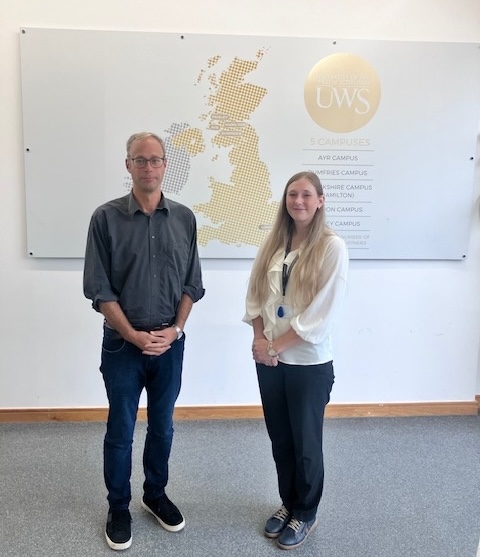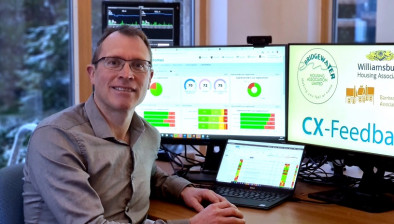Kamila Feddek: Reflections on housing, cost-of-living, care, health, and employment in Renfrewshire

Dr Hartwig Pautz (senior lecturer in Social Sciences and co-lead of the UWS-Oxfam Partnership, University of the West of Scotland) and Kamila Feddek (financial wellbeing co-ordinator, Williamsburgh Housing Association and social justice researcher)
Social justice researcher Kamila Feddek discusses the key findings from a series of policy workshops focused on Renfrewshire, outlining the interconnected challenges of housing, the cost-of-living crisis, care, health, and employment, alongside solutions proposed by local stakeholders.
Between November 2024 and May 2025, I participated in a series of policy workshops on the University of the West of Scotland’s Paisley campus. Organised by the UWS-Oxfam Partnership and the university’s Sustainable Policy Analysis Research Centre, with support from the UK Social Policy Association, each session sought to bring together public, private, and third sector voices from Renfrewshire to explore how issues around housing, cost-of-living, health and wellbeing, care, and employment and learning play out in Renfrewshire.
Facilitated by UWS academics Hartwig Pautz, Chloe Maclean, Greig Inglis, Damian Dempsey, Nicoletta Ciubotario and Olalekan Oyedepo, the ‘Afternoon Tea and Policy in Renfrewshire’ workshops created space for honest, evidence-based and often challenging discussions rooted in the lived realities of our communities – and led to a range of ideas that could help ‘dealing’ with the issues.
As an active participant, I synthesised the discussions into the following reflections on each of the five themes.
Housing in Renfrewshire – shortages, suitability, and ‘role creep’
Renfrewshire faces a substantial shortage of both social housing and mid-market rental (MMR) properties. Participants pointed to Renfrewshire Council’s Local Housing Strategy 2023–2028, which recognises MMR as part of the Affordable Housing Supply Programme – yet the current Strategic Housing Investment Plan 2025–2030 contains no explicit MMR projects.
Meanwhile, demand outstrips supply, but it is also the mismatch between housing stock and local needs that were observed as problematic during the workshop. In particular, the following issues were raised: high-rises and tenements are less popular; families want houses with gardens; older residents need homes adapted to their mobility needs and social care requirements; new housing developments are often poorly connected to public transport, childcare, and shops, isolating those without cars.
Housing associations are increasingly stepping in where other services have been cut, providing everything from rubbish removal to de facto social care. While this ‘role creep’ may deepen housing associations’ understanding of tenants’ needs, it also diverts scarce resources away from their core tasks.
Another key point highlighted during the workshop was the more robust use of Section 75 planning obligations under the Town and Country Planning (Scotland) Act 1997 to secure affordable housing from private developments. Participants also emphasised the importance of prioritising the delivery of social housing when disposing of publicly owned land, ensuring that local authority assets contribute directly to meeting the housing needs.
The cost-of-living crisis – beyond ‘heating or eating’
Participants noted that, in their view, the cost-of-living crisis has widened the gap between Renfrewshire’s well-off areas and those facing multiple deprivation. Rising rents, mortgage payments, energy bills, and food costs are forcing households into impossible choices – ‘heating or eating’ – with knock-on effects for health, education, and general wellbeing.
Workshop participants noted increasing rent arrears in social housing, surging food bank demand at a time of reduced donations, and transport costs pricing people out of jobs or training. Single parents were reported to be hit by higher childcare costs; young people face cuts to youth services and unreliable public transport. Those with no recourse to public funds, single persons working but just above the threshold disqualifying for social security benefits, are particularly vulnerable.
Good practice examples, as mentioned in the workshop, included the Winter Connections Renfrewshire warm spaces programme, free school meals, and community transport replacing cancelled commercial bus routes. Suggestions on what should change revolved around longer-term year funding for community organisations, better data sharing, devolved decision-making, and meaningful inclusion of lived experience in policy and budget setting.
Care and caring – start with a house
One major issue which was emphasised was Renfrewshire’s shortage of adapted homes and how it directly affects the quality of care and the wellbeing of unpaid carers. Without suitable housing, people’s independence is reduced and care becomes harder to deliver effectively.
Participants spoke about inadequate home care services, the undervaluing of paid care work, and the ‘postcode lottery’ in social care provision. Funding shortfalls have also hit palliative care services in the third sector.
One key solution discussed was adopting the “Housing First” approach — not only as a model of care for those with complex needs, but also alongside earlier interventions to help prevent people reaching crisis point. Localising the delivery of health and social care services, without moving toward NHS privatisation, was also seen as a positive step.
Participants highlighted the value of creating new, community-led support networks. Additionally, businesses were identified as potential allies — particularly through offering flexible working arrangements and recognising the caring responsibilities of their staff.
Health and wellbeing – complexity and connection
Participants described Renfrewshire’s health system as ‘failing’ in some areas: long waits for acute mental health referrals, GP shortages in rural areas, over-reliance on phone appointments, and a lack of awareness on issues like menopause were discussed.
They stressed that health is linked to housing quality, cost-of-living, transport, environment, and community connection. Specific examples included poorly maintained playgrounds, a shortage of allotments, and public spaces inaccessible to wheelchair users.
Among the ideas to deal with the problem were proposals such as a mobile ‘one-stop-shop bus’ to reach poorly connected areas, developing housing associations into broader support hubs, mapping all local health and wellbeing resources into a Renfrewshire-specific directory, encouraging active travel, and making wellbeing a requirement in public procurement contracts.
Employment and learning – bridging the disconnect
A major theme was what participants described as the ‘disconnect’ between employability services such as Invest in Renfrewshire, Skills Development Scotland, and Jobcentre Plus – with poor referrals and inconsistent communication.
In Paisley, both hospitality businesses and law firms report difficulty filling vacancies, citing factors like high parking fees and a mismatch between job offers and jobseekers’ desire for remote work. Fixed-term, low-paid jobs offer little incentive for retention or progression.
Participants noted that local universities and colleges don’t always align courses with Renfrewshire’s labour market needs and questioned whether graduates want to live and work locally. Modern Apprenticeships were praised in principle but were seen as under-promoted.
Proposals for good change included stronger school–employer links, more paid student work placements, public outreach from Invest in Renfrewshire using success stories, and joint forums with employers, training providers, and the third sector.
Building a platform for change
Across the workshop summaries, several overarching challenges emerged: ongoing funding cuts and rising costs, increasing pressure on overstretched services, and growing demand on support organisations due to the complex needs of Renfrewshire residents. Participants also pointed to poor coordination between services and referral processes that are often unclear, inconsistent, and overly complex — all of which hinder timely support. These issues are compounded by short-term funding cycles and a lack of trust between communities and service providers.
The Question Now: How Can These Issues Be Addressed?
One of the most pressing challenges identified across the workshops was the short-term nature of funding. This issue underpins many of the wider problems — particularly the difficulty in delivering lasting policy solutions. Shifting to longer-term funding cycles would allow organisations to build capacity and resilience, develop stronger partnerships, and improve coordination across services.
What may appear on paper to be a small policy change will, in practice, require a significant push to become reality. For me, the clearest message from the workshops was that sustainable change in Renfrewshire depends on two things: more scope for long-term funding and much better coordination of truly person-centred services.
Beyond this, the workshops demonstrated the depth of expertise that already exists in the area — including both professional insight and lived experience. Participants brought forward practical ideas that could meaningfully address the challenges we face. There is also a strong network of cross-sectoral relationships in place that can be further developed and strengthened.
Importantly, the workshops revealed a shared ambition to make Renfrewshire a place where everyone can live well and thrive. The challenge now is to turn that ambition, the existing expertise, and the live connections into sustained drivers of change — and to keep pushing for systems that respond to people’s real needs, rather than forcing people to navigate systems that don’t work for them.
- Kamila Feddek is financial wellbeing co-ordinator at Williamsburgh Housing Association







